PAID TO LEAVE
Jody Adams-Birch, Eric Maki, and Christine Schneikart-Luebbe left Wichita State this year and received more than $535,000 from separation agreements that limit what they can say about the university.
Photo illustration detailing payments made to Wichita State employees who left their positions last school year.
Three Wichita State employees who left the university this year received more than $535,000 from separation agreements.
The Sunflower obtained the terms of separation between WSU and former employees Jody Adams-Birch, Eric Maki, and Christine Schneikart-Luebbe through Kansas Open Records requests.
Adams-Birch worked as WSU’s head women’s basketball coach before her employment was “terminated” January 19. She had been with the university since 2008. Maki worked at WSU as the director of campus recreation from 2012 until his resignation March 8. Schneikart-Luebbe worked as associate vice president of student affairs and also served as student government advisor until March 17, after 23 years at WSU.
The documents state that the former employees “withdraw and agree to voluntarily dismiss … any and all charges, grievances, claims, complaints, and lawsuits” they may have filed against the university relating to their employment and departure from the university.
The former employees signed the documents, which include non-disparagement clauses. The clauses state that the former employees will not make any statement or take any action that could “embarrass or humiliate” officers, employees, or students of the university or cause the institution to be “held in disrepute.”
Additionally, the documents include non-disclosure agreements.
“Any information relating to (Wichita State University’s) future plans and its methods of doing business, identities of (the university’s) business affiliates, and its policies and procedures” are also protected under the non-disclosure clause.
The documents state that the agreements are not an admission of “liability or unlawful conduct of any kind” by the university or employees.
The document also states that in addition to legal consequences already in place for violation of non-disclosure agreements, the former employees would be required to return the money they received upon resignation if they violate the agreement. The university is also entitled to injunctive relief against a breach of non-disclosure, according to the agreement.
The former employees agreed to “permanently, unequivocally, and unconditionally” waive all rights to resume employment with WSU in the future.

Head coach, Jody Adams-Birch, yells at the referee about a perceived missed call against Creighton earlier this year. She soon parted ways with WSU.
JODY ADAMS-BIRCH
The terms of former women’s basketball coach Adams-Birch’s separation agreement state that she received $250,000 upon resignation.
Adams-Birch received an additional $23,748.92 in unused paid leave which she earned while employed at the university.
Adams-Birch left her position as WSU’s career-wins leader and finished with a 161-115 record. She led the Shockers to three straight Missouri Valley Conference regular season and tournament titles in 2013-15. Adams-Birch had received raises in each of the last two seasons.
In 2015 she earned a salary of $309,183, the third highest paid state salary at Wichita State behind Executive Director of NIAR John Tomblin and University President John Bardo.
Four players quit the team following a 29-win season in 2015. Thirty eight people involved with the program were interviewed regarding the atmosphere of the program, with Adams-Birch receiving complaints about the mistreatment of players.
The investigation was followed with Adams-Birch agreeing to make changes in the programs and allow players and coaches to work with a consultant in sports psychology.
The separation agreement mentions that the university is not to make any statement or take any action to “damage or lower (Adams-Birch’s) reputation, embarrass or humiliate her.”
Adams-Birch and Darron Boatright, director of athletics, signed the agreement Jan. 24.
Prior to her leaving the program, Adams-Birch had been suspended for two games during an investigation that followed sophomore Ellie Lehne’s transfer from the women’s basketball program.
Adams-Birch could not be reached for comment.

Eric Maki
ERIC MAKI
Maki resigned from his position the day after the student senate voted down a proposal to increase student fees to build a YMCA on Innovation Campus. Maki had been outspoken about the effects the addition of a YMCA would have on Campus Recreation.
Maki’s separation agreement states that he voluntarily resigned his employment with WSU. Schneikart-Luebbe and Adams-Birch’s separation agreements do not mention voluntary resignation.
The document states that Maki received $49,679.04 — the equivalent of six months salary — upon his resignation.
Additionally, Maki agreed to be “reasonably available” to the university for a four-year period following his resignation to discuss “his knowledge of any matters that pertain to pending or threatened litigation.”
Maki signed the agreement March 29. Tony Vizzini, provost and senior vice president, signed it April 4.
“Are we gonna have a role (in the YMCA)? Are we gonna have a job?” Lee said in March.
Maki has declined to answer The Sunflower’s questions about his resignation.

From left to right: Former Student Body Vice President Taben Azad, former Associate Vice President of Student Affairs and Dean of Students Christine Schneikart-Luebbe and former Student Body President Joseph Shepard
CHRISTINE SCHNEIKART-LUEBBE
Schneikart-Luebbe resigned one day before spring break and two days following a vote of no confidence in President John Bardo by the student senate. Her resignation also came just over a week following Maki’s.
Schneikart-Luebbe’s sudden resignation after 23 years of employment at the university left students questioning whether she resigned willingly or was forced out of her position. Several paid advertisements in The Sunflower have questioned the circumstances of her resignation.
Schneikart-Luebbe’s separation agreement states that she and the university “mutually agree” to end her employment.
Although the agreement states that Schneikart-Luebbe’s job duties and responsibilities ceased March 17, her employment would not officially end for another year.
Schneikart-Luebbe will continue to receive her full salary and benefits until March 16, 2018, according to the agreement. Her salary for fiscal year 2017 was $131,954.
The agreement also states that Schneikart-Luebbe will receive an additional $80,000 in two $40,000 lump-sum payments.
Schneikart-Luebbe’s non-disparagement agreement states that she is not to “interfere with, advise, or otherwise counsel employees or current students of (Wichita State University) concerning any matter involving Wichita State University or its administration.”
She also agreed to avoid actions or statements that are “disruptive to the mission and goals of (Wichita State University.)” These additional non-disparagement clauses were not included in Adams-Birch or Maki’s severance agreements.
The university also agreed to avoid statements or actions to “damage or lower (Schneikart-Luebbe’s) reputation, embarrass or humiliate her.”
Schneikart-Luebbe and WSU agree that breach of the “mutual non-disparagement” agreement “would be difficult to determine.” If either were to violate it, they agree to pay the other party “at least $5,000, or such higher amount that can be proven, for each violation.”
Until March 16, 2018, or until she starts new employment — whichever occurs first — Schneikart-Luebbe will be on administrative leave status and retain her title of associate vice president of student affairs, according to the agreement.
Additionally, any statement made by the university concerning Schneikart-Luebbe’s employment will be “mutually prepared and approved by (Schneikart-Luebbe), with input from her counsel, and (Wichita State University).” This includes her resignation statement.
“I have determined it’s time to move on to the next opportunity. I have loved working with students and their families and alongside great people to advance this wonderful university. I’ve also reached the difficult decision that it’s time for me to move on to my next challenge,” the resignation statement said.
“I look forward to taking a little time to spend with my family while determining what my professional chapter will be. I wish the best for Wichita State University and all its great people.”
Schneikart-Luebbe signed the agreement March 31. Teri Hall, vice president of student affairs, signed it May 18.
He described what he saw as the bullying of Schneikart-Luebbe by other administrators.
“I think that Christine was put in this position to fail — to give the administration a reason to let her go,” Shepard said in October.
“I’ve seen her be bullied. I’ve seen her not have a seat at the table where she should,” he said.
Shepard said at the time that Schneikart-Luebbe’s circumstances reminded him of a former student government faculty advisor.
Robinson claimed that he was retaliated against by university administration and eventually lost his job for expressing concern over the handling of a rape accusation against a student-athlete in 2013.
“I can’t ignore the signs,” Shepard said.
Schneikart-Luebbe has declined to answer The Sunflower’s questions about her resignation.
—Records obtained by Chance Swaim

Jenna Farhat was the news editor of The Sunflower. Farhat majored in creative writing.

Madeline Deabler was the advertising manager for The Sunflower. Deabler double majored in journalism and graphic design. Originally from Omaha, Nebraska,...

Hannah Roberts was a photographer for The Sunflower. Roberts majored in entrepreneurship and minored in communications. She was born and raised in Wichita,...




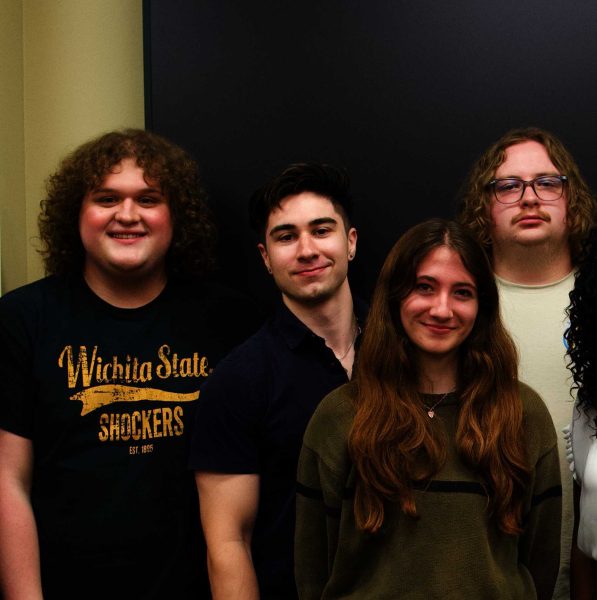
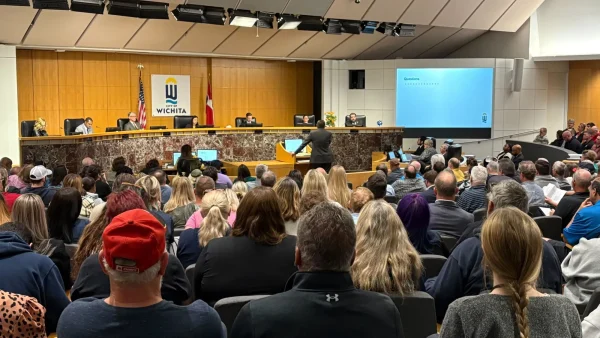
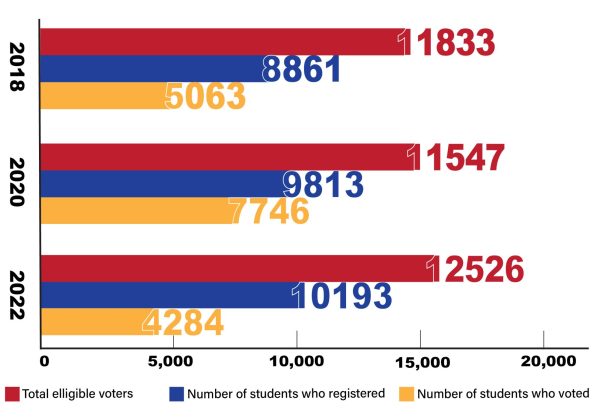
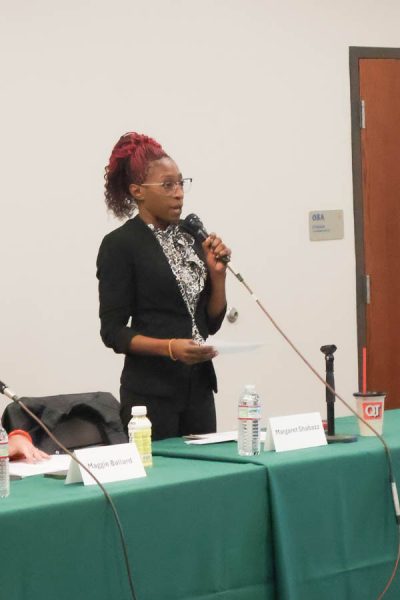



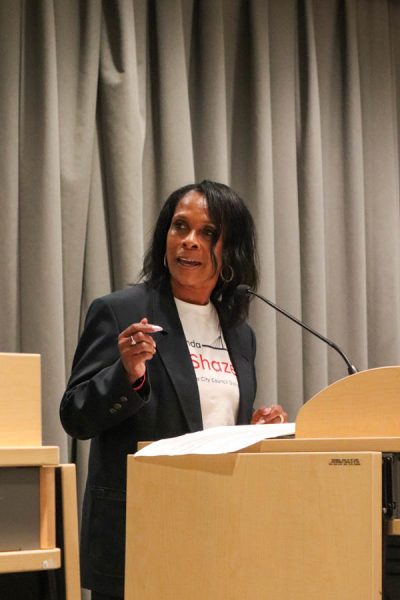
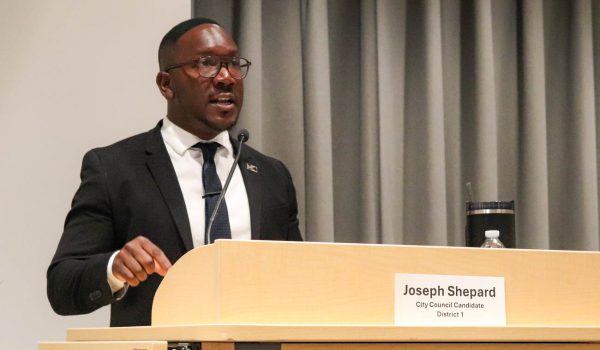
Fake Pres. Bardo • Jul 20, 2017 at 11:41 am
Guys, I need help starting a Shocker credit card company. Students are not going to have enough money to spend at the innovation campus. We will lend money to students so they can buy coffee and football err.. basketball tickets. Students deserve good tasting coffee and I want to help them get it. Oh, did I mention that we will start charging students for WSU basketball tickets… wait or was that just in my dream. Whos in?
-Come to my office if you want to be a vice president of the Shocker credit cards department. Starting salary is $150,00/year preferred interviews will go to individuals who lived a significant portion of their life out of state.
As always,
Fake Pres. Bardo
Steve • Jun 8, 2017 at 8:45 am
Bardo has been a disaster for WSU. He takes advantage of every possible opportunity to price gouge students that are already struggling to afford college. First he removed one of the largest and most convenient student parking lots to install his new dorm. After that was done, he began charging all students, staff and visitors to park on campus – a campus that was built using taxpayer dollars. He attempted to force students to pay for a football program that very few people even want. Now he will force students to pay for a YMCA most won’t use and the increased costs of the basketball program even though most of the tickets are unavailable to students.
Enrollment is down, staff morale is at an all time low and Bardo doesn’t even pretend to care. Bardo is slowly killing WSU. But all he cares about is enriching himself and his inner circle by personally cashing in on the selling of public property to private businesses. Bardo and his crew are a bunch of self serving scumbags.
Makes You Wonder • Jun 8, 2017 at 8:00 am
What is WSU working so hard to hide with all these buyouts, requirements to not have people talk, and lawsuit settlements? An Eagle story said they could fire Jody for “good cause” and owe nothing so why wouldn’t they do that if they had so much? Why would Boatright pay a large amount for what the Eagle reported WSU as reporting as a mutual and amicable separation? Is there something there? Why settle with Jim Pulliam? Who all was involved in issues he encountered? What is being kept from the public with all this money?
Tex • Jun 9, 2017 at 3:52 pm
I see you also wear a tinfoil hat; I like mine, it helps me get better reception from the mother ship.
#thetruthisoutthere
Settlement • Jun 7, 2017 at 7:53 pm
A few months back WSU settled a lawsuit with Jim Pulliam that Jim filed alleging sexual harassment and racial discrimination. Can the Sunflower find the amount of that settlement? It would be interesting to learn what WSU paid Jim to keep the details from being made public at a jury trial and who all was involved.
Jim’s lawyer was Kirk Holman out of Kansas City. His web page at (kdh-law.com) lists jury awards from cases he won. A sexual harassment jury trial award is listed at $420,000 and a racial discrimination jury trial award is listed at $350,000. While Jim’s case was settled before a jury trial I wonder if Jim’s settlement was for something like the total of those awards combined. Jim probably had to sign a non-disclosure and non-disparagement agreement as well.
Not everyone had to sign non-disclosure and non-disparagement agreements.
Emily schlenker • Jun 7, 2017 at 12:30 pm
Now, this is journalism! Well done! Now we know where the money is really going.
Tex • Jun 7, 2017 at 12:29 pm
Never mind that this is a fairly common practice at institutions the world over, let us all put on our tinfoil hats and complain about Bardo and Hungate and how the administration is trying to keep us down! It is all a conspiracy by the administration! Bardo and Hungate are out to get us! I am a victim, a victim I tell you!
I say we ask for everyone at the University to resign! The University can run itself, who needs people to be there making sure things happen and that everything functions smoothly!
Let us protest because it is trendy and we all think we are revolutionary thinkers who will save the world. I will bring duct tape and a sign and we can all hang out protesting instead of having jobs or taking showers.
Viva la revolución!
Rex • Jun 7, 2017 at 2:32 pm
Remember that at WSU, freshman are more likely to drop out or transfer to a different university than graduate.
LESS than 20% of starting freshman will graduate on time in 4 years.
Incoming freshman will have to spend $1000/month to live in freshman dorms with a meal plan.
It’s a recipe for a financial disaster for WSU. Bardo and company cannot get it past their rich east coast mindset that students in kansas will not foot the bill for absurd on campus living costs.
Tex • Jun 8, 2017 at 3:14 pm
Which sources are you using to validate this graduation rate? And have you compared these statistics to other universities? What part of the percentage you came up with are enrolled full-time for all four years and which students are only part-time?
Or are you just arbitrarily making up statistics and only viewing them in the microcosm that is Wichita State University without bench marking them against other, similar universities to see where Wichita State actually stands by comparison?
And since your argument alludes that this is all pretty much Dr. Bardo’s fault, have you compared these rates to a time before Bardo came to Wichita State to actually validate he was the source of this change? Have you also taken into consideration external economic conditions that might affect the ability to attend a university? Or the ability to continue at a university? Or are we just going to blame Bardo for everything when there might be more plausible reasons out there?
Rex • Jun 14, 2017 at 9:58 am
The sources are for first time students. From personal experience not much has changed over the last several years, most of the people I met in the dorms did not graduate from wsu. Personally I went 3 years without an academic advisor remotely close to my field of study.
“This ranks the school [Wichita State] among the worst in the country at graduating first-time/full-time students on time…”
https://www.collegefactual.com/colleges/wichita-state-university/academic-life/graduation-and-retention/
Government website showing same stats
“https://nces.ed.gov/collegenavigator/?q=Wichita+State+university&s=all&id=156125#programs”
Which Practice? • Jun 7, 2017 at 8:05 pm
Paying people or discrimination/retaliation/harassment?
Tex • Jun 8, 2017 at 1:44 pm
You are right! Now that I have my tinfoil hat on I can see the article clearly is not about severance pay or the nondisclosure agreements (which are the common practices I was referring to), but the article is about how the administration is trying to cover up their retaliation and harassment.
Quick clarification though: are we talking about Joseph Shepard’s administration while he was in Student Government Association or the University Administration? I always get confused between the two when we start talking about covering up retaliation and harassment! 🙂
Clarity and Cost • Jun 8, 2017 at 7:34 pm
University Administration. Glad to help clear that up for you. The private attorney from Kansas City the University Administration hired to investigate Joseph and Taben who found absolutely nothing should have also helped clear that up for you.
Can the Sunflower staff find through an open records request how much that private attorney from Kansas City cost the Kansas taxpayers? To find absolutely nothing.
Tex • Jun 8, 2017 at 11:33 pm
So it is basically the same thing as the District Attorney not finding anything with Paige Hungate’s parents. I mean in both instances they “found absolutely nothing” from a concrete evidence standpoint. So by your logic, nothing happened that night at the SGA banquet; there were no fighting words, there were no racial slurs, there was no altercation. We would expect to “find absolutely nothing” there.
And before you say something about there being multiple people at the SGA banquet with Joseph who witnessed the alleged events, I will point out that there were also multiple students who filed the Code of Conduct complaint against Joseph and multiple others who outside of that process made it clear that Joseph was a bully towards them and others.
So are we just going to sweep what has happened in both instances under the rug? You are starting to sound like an Administrator! 😉 Thank you for clearing everything up by the way.
Helpful • Jun 12, 2017 at 12:48 pm
No problem. I like to help you. The DA said he could not prove beyond a reasonable doubt the violation of law related to her intent in what she said. He certainly does not say she didn’t say it. That isn’t even disputed.
The lawyer from Kansas City interviewed multiple people over months and couldn’t even meet the Code of Conduct standard, preponderance of the evidence, which is way less than beyond a reasonable doubt.
Big difference here in the standard of evidence.
Who are the multiple students who filed Code of Conduct complaints against Joseph?
I think a report from the private lawyer would help clarify much for you as well. Glad to help as usual.
Shin • Jun 6, 2017 at 9:30 pm
It’ll only be Bardo and Hungate remaining in a few years. Just the two of them and no WSU.
A former studnet who can say anything • Jun 6, 2017 at 8:01 pm
I was told by a biology professor that the LAS college knowingly keeps lab classes small to force students to take other classes that cost less and stay enrolled longer. The result is long waitlists and students unable to take pre-reqs to graduate on time.
I asked, shouldn’t by logic opening up more seats create more money for the department? The answer is: No, administration will take the extra money gained from opening up more seats.
Bardo and company gots to go.